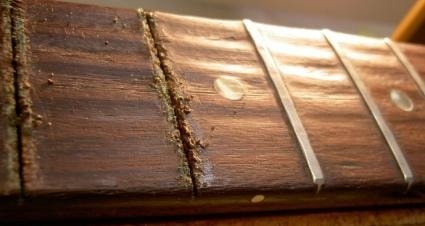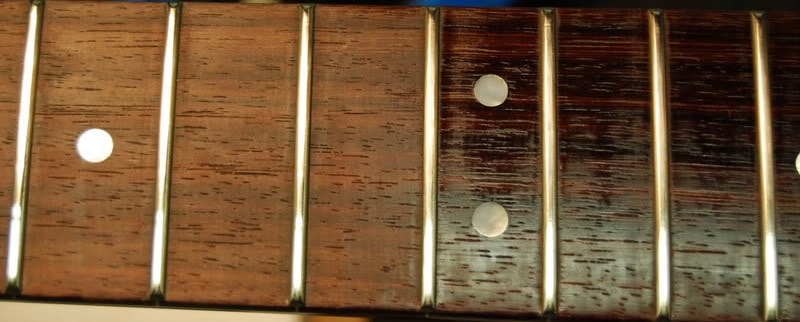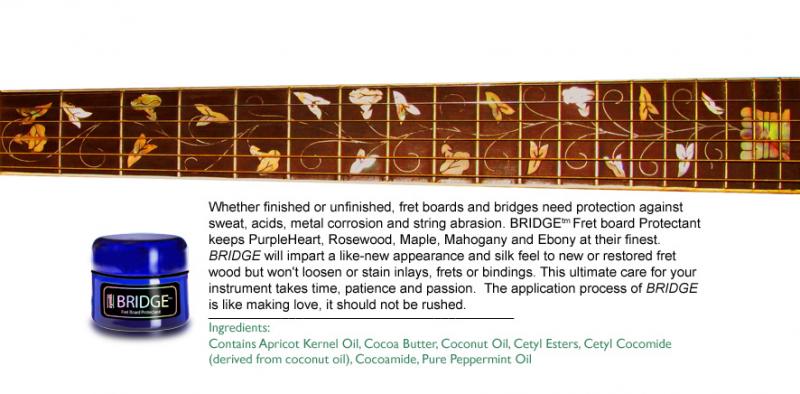Your Cart is Empty
NOW FREE SHIPPING TO 48 CONTIGUOUS UNITED STATES ON ALL ORDERS!!!
Best Way to Clean & Protect Your Fretboard/Fingerboard (Coconut oil is the key)
by vaughn skow September 15, 2016 2 min read

I’m reading an advertisement from a fret protectant product by Zymol called “Bridge”; the advert says EXACTLY what I want to say, and so I’ll repeat it here word for word:
“Bacteria is formed by the sweat, salt and acids from your hands entering your fret board. When this bacteria no longer has you as it’s life support it consumes the next best organic material … your fret board wood! The result is discoloration, loose frets, a slime-yeast build up and poor sound quality”
Boy … sounds like something to avoid, doesn’t it? Let’s talk about that.
First, I’ll mention that this blog is NOT about re-fretting a guitar, or about polishing frets; that might be a good topic for another day, but today we are talking specifically about cleaning and protecting the wood of your fretboard.
Cleaning:
If your fretboard is sporting only the usual player’s grime, then I recommend cleaning it with nothing more than a good bit of old fashioned elbow grease, a cloth with water and a mild soap, like dish detergent. Personally, I like old socks as the cloth. If you are cleaning a board with decades of ground-in grime, then I use a product like LA’s Totally Awesome Cleaner and/or naphtha. Be aware that the stronger the cleaner, the more likely you are to wind up with a dry oil-depleted fretboard. Which brings us to…
Protecting:

Here is where my opening quote comes in, and here is where I like coconut oil (which just happens to be a main ingredient in Zymol’s Bridge product). Some folks prefer lemon or some other oil on fretboards while others shout “use nothing at all”. Personally, I am among the use nothing crowd when we’re talking about say, a maple board finished in a bunch of polyurethane. I mean, really … nothing’s going to penetrate that PLASTIC anyway; any oil you try to apply will just rub/drip off! However, if we are talking about an unfinished board, especially rosewood or ebony, or an old board with little to no nitro left on it … then I oil the board, especially if it’s noticeably dry.
Why coconut oil instead of lemon, orange, or one of the other oils? Because it kills fungus, bacteria, and viruses. Yep, it kills all that crap that would like to eat your fretboard. A couple of nice side benefits are that it’s super easy to work with since it is a paste at room temp, and that it just might keep you from catching a virus! When working coconut oil into the board, remember to use it sparingly. Just a couple little dabs on a cloth will get you through the average fretboard. If it’s a super dry board, you might repeat the process. And, you will always want to thoroughly rub the board down with a dry cloth afterwards … unless maybe you want a little to rub off on overly dry finger tips!
Oh, and if you like the idea of using a product specifically for guitars, by all means ... I sugest using the Zymol product ... with all it's coco-nutty goodness :-)
Leave a comment
Comments will be approved before showing up.

